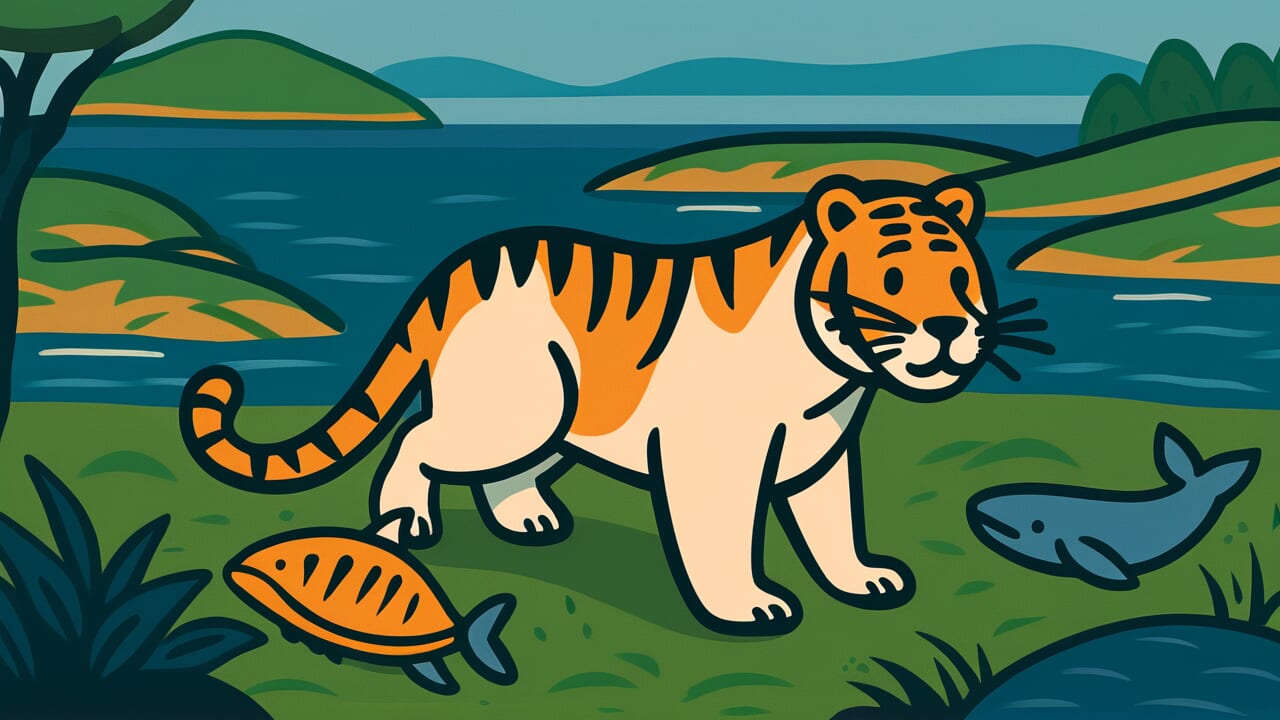How to Read “Where tigers crouch and whales wash ashore”
Tora fusu nobe, kujira yoru ura
Meaning of “Where tigers crouch and whales wash ashore”
“Where tigers crouch and whales wash ashore” is a proverb that describes remote, undeveloped lands where few people go.
It refers to wild plains where tigers hide and shores where whales swim close. These are frontier places untouched by human civilization.
This proverb describes lands that remain undeveloped or places where people rarely travel. Places where large wild animals like tigers and whales take center stage represent natural environments far removed from human society.
Today, places where tigers or whales actually appear are limited. But this expression is still understood as describing frontier or unexplored regions.
In our urbanized modern world, this phrase holds value as a way to describe pristine, untouched nature. It poetically expresses places outside civilized society where wilderness remains intact.
Origin and Etymology
The exact first appearance of this proverb in literature is unclear. However, the structure of the phrase reveals an interesting background.
It combines two contrasting scenes: “where tigers crouch” and “where whales wash ashore.” Tigers represent land predators, while whales symbolize giant sea creatures.
Both have long captured Japanese imagination. However, wild tigers never lived in Japan. This expression likely reflects cultural influence from mainland China.
In China, tigers were real and fearsome beasts. They symbolized dangerous lands where humans could not approach.
Whales, on the other hand, are creatures that actually appear along Japanese coasts. Shores where whales washed up were often remote places far from human settlements.
The phrase “where whales wash ashore” carries the nuance of places dominated by natural forces beyond human control.
The contrast between land and sea, tigers and whales, shows ancestral wisdom. They tried to comprehensively express all directions of undeveloped land.
To describe lands beyond civilization’s reach, they chose the most powerful symbols of nature.
Interesting Facts
When whales washed ashore, it was called “kujira-yori” in Japanese. During the Edo period, this was a major event that could enrich an entire village.
There was even a saying that one whale could sustain seven coastal communities. Yet shores where whales washed up were also remote frontier lands where such rare events occurred.
Tigers appear in many Japanese proverbs and idioms despite never living in Japan. This results from Chinese cultural influence.
Though Japanese people never actually saw tigers, they became deeply rooted in Japanese hearts as symbols of strength and fearfulness.
Usage Examples
- The settlement group moved into undeveloped land like where tigers crouch and whales wash ashore
- This region was once so remote it was called where tigers crouch and whales wash ashore
Universal Wisdom
“Where tigers crouch and whales wash ashore” contains deep insight about the boundary between humans and nature.
Human history has always been a history of challenging unknown lands. Places beyond civilization’s light held both fear and possibility.
Plains where tigers lurk and shores where whales appear were dangerous for humans. Yet they were also places where untouched, abundant resources lay waiting.
Behind this proverb’s transmission lies the relationship between expanding human society and nature. As civilization developed, people opened frontier lands and built new societies there.
But they also maintained reverence for places beyond human reach.
This structure remains unchanged today. We have built convenient, safe societies. Yet beyond them still exist natural domains where human power cannot reach.
This proverb teaches a universal truth. Human endeavors have limits. We should remain humble before the power of nature.
When AI Hears This
Both tigers and whales are the strongest in their environments. What’s interesting is that their strength results from “complete optimization to specific places.”
In ecology, the more a species specializes in specific environmental resources, the more competitive it becomes there. But it also becomes completely non-functional in other environments.
This is called “niche specialization” in technical terms.
Tigers specialize in ambush hunting using forest terrain. Their stripes provide perfect camouflage in dappled sunlight. But this optimization means “powerless without forests.”
Similarly, whales specialized in maintaining huge bodies underwater and sonic communication. But if they wander into shallow water, their internal organs get crushed by their own weight and they die.
The stronger they are, the more they carry the constraint of “can only live in this place.”
The expressions “crouch” and “wash ashore” in this proverb show exactly this dependency. They don’t choose locations by will. Evolution bound them to specific environments.
Ecological data shows specialized species have higher extinction rates from environmental changes. As payment for abandoning versatility and perfecting specialization, they cannot exist without specific environmental resources as their “lifeline.”
Being the strongest and being most vulnerable are actually two sides of the same coin.
Lessons for Today
This proverb teaches modern people the importance of humility. Not everything can bend to human will.
In modern society, technological development has made many things possible. But this makes us prone to forgetting that domains exist beyond human power.
This proverb reminds us that places exist where human hands cannot and should not reach.
In your life too, domains you cannot control will always exist. Rather than trying to proceed according to plan in everything, sometimes you need to surrender to natural flow.
Just as undeveloped lands make developed lands stand out, it’s okay to leave some parts of your life untouched.
This proverb also teaches respect for diversity. Not only civilized places have value. Untouched nature has its own unique value.
Similarly, recognizing and respecting people who live differently from you forms the foundation for creating a rich society.



Comments